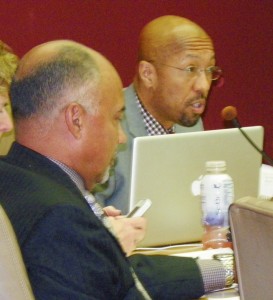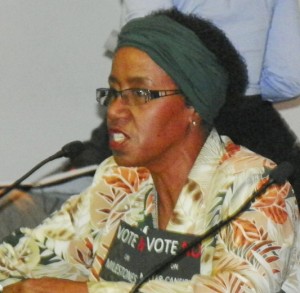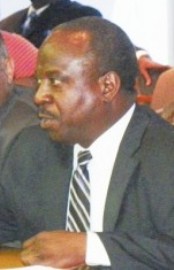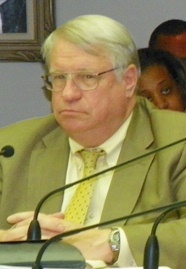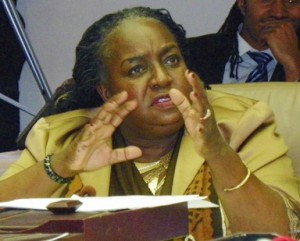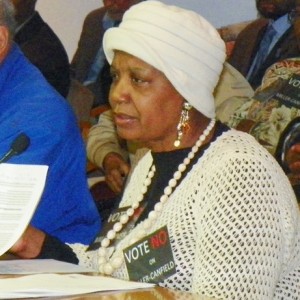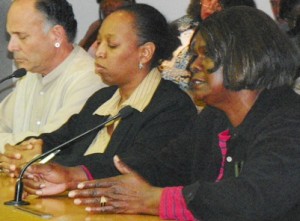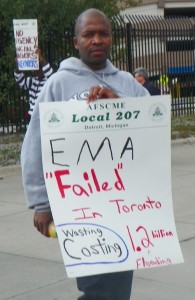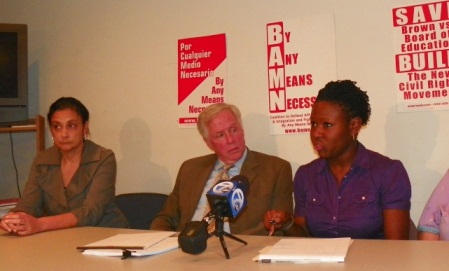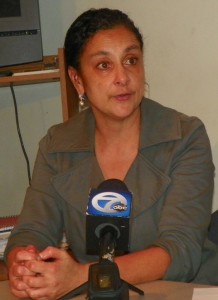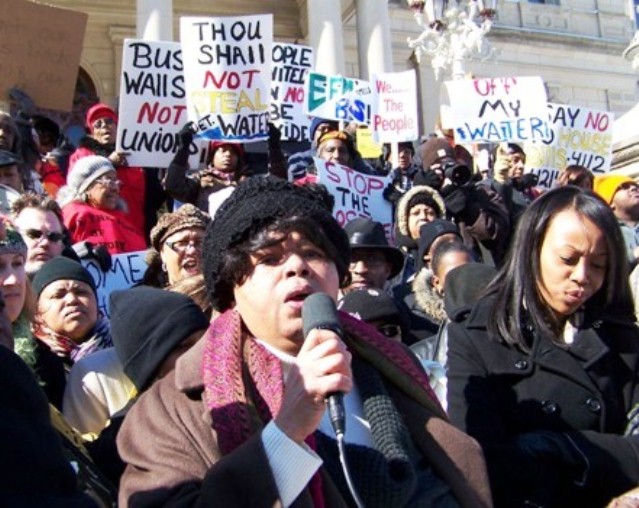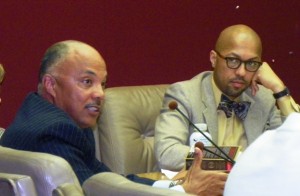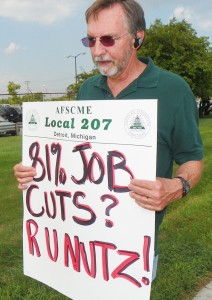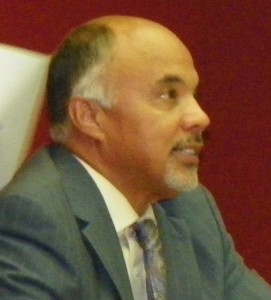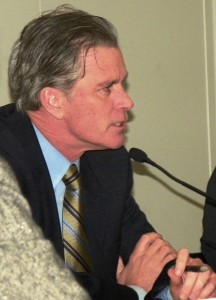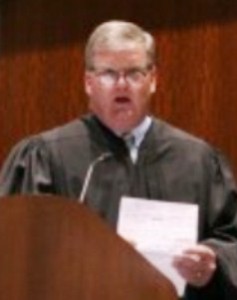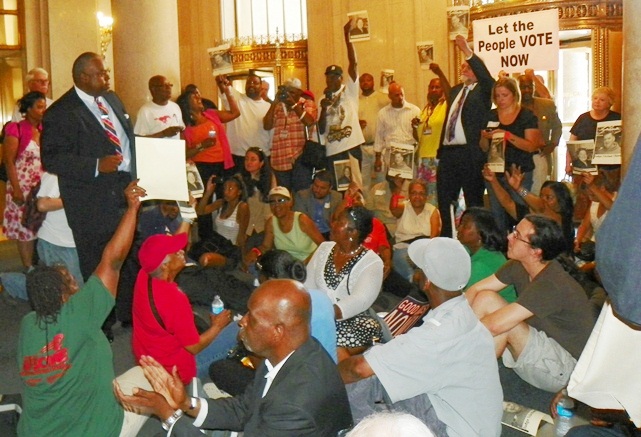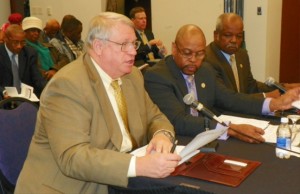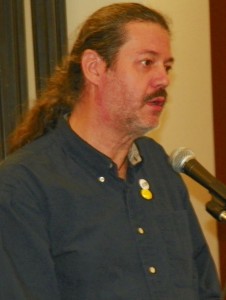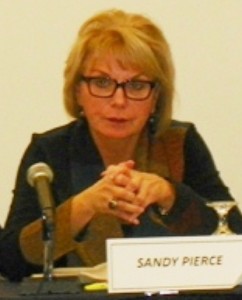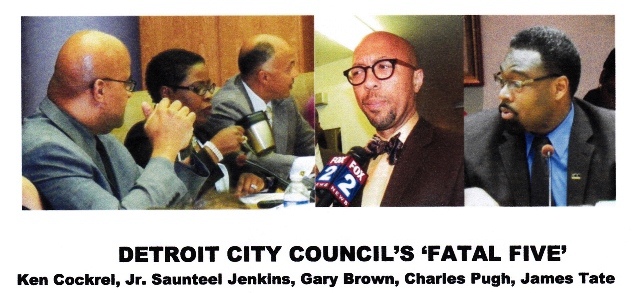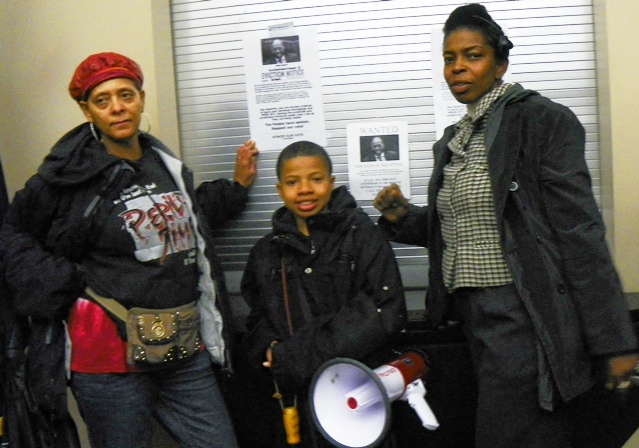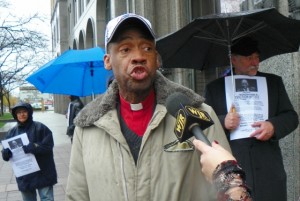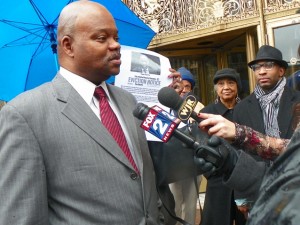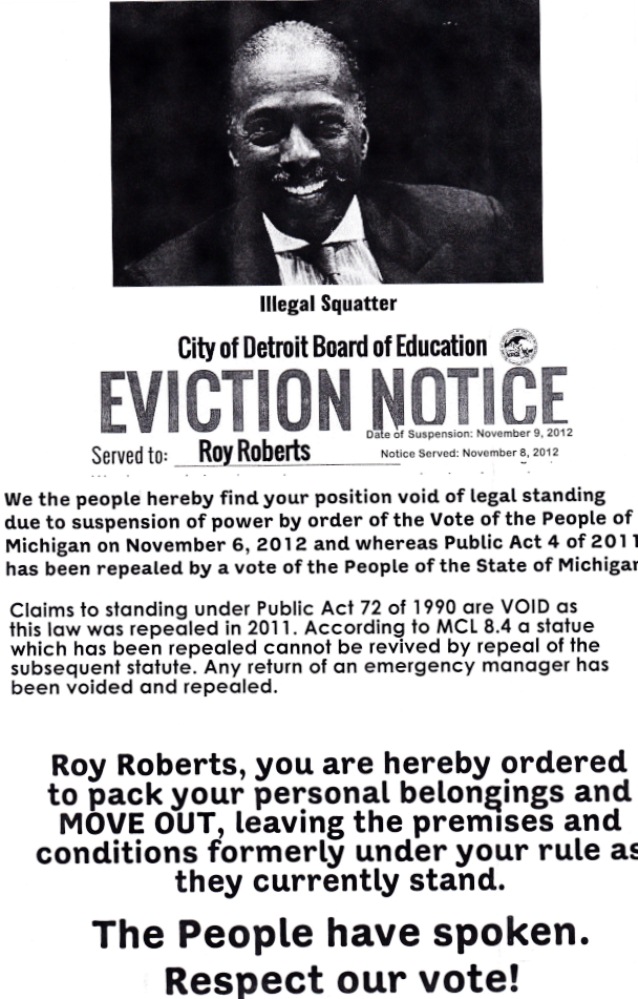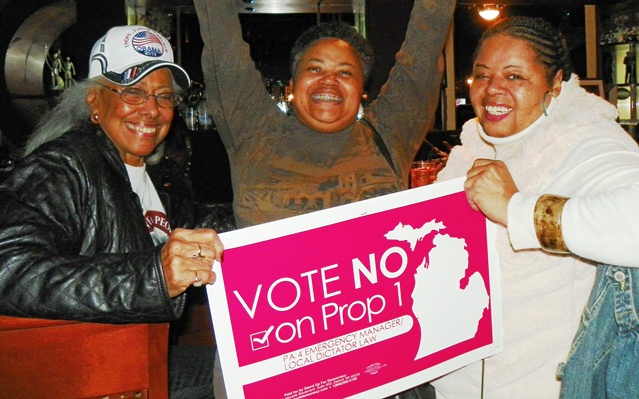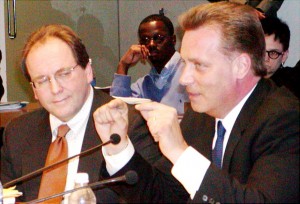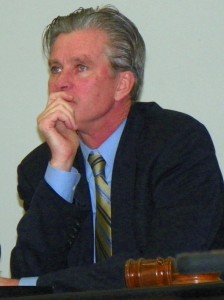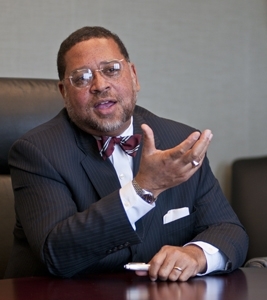
Sandra Hines (l) and other Detroiters pack City Council hallway prior to session Nov. 20, 2012. More and more kept arriving, but Council President Charles Pugh refused to move the meeting to the auditorium despite the willingness of the Zoning Appeals Board and a second event there to switch places. Hundreds including seniors and disabled people waited outside for hours, chanting, “Let us in or we’ll shut it down!” They were unable to see or hear the proceedings at all, in violation of the state’s Open Meetings Act, until allowed in to comment for one and a half minutes.
EMA, MILLER-CANFIELD CONTRACTS GO DOWN, but Bing, top council officers still plot to get them passed
Other issues: Hantz and Henry Ford hospital land developments, D-DOT contracts, department closures
Pugh violates OMA, denying residents access to meeting for hours
Wall Street, Bing, state respond with further threats to workers, poor
By Diane Bukowski
November 23, 2012
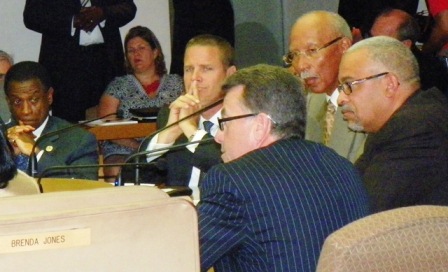
When Miller-Canfield speaks: Atty. Michael McGee (in blue suit) advises (l to r Detroit CFO Jack Martin, now disappeared Detroit COO Chris Brown, Mayor Dave Bing, and Deputy Mayor Kirk Lewis on matters involving Public Act 4 and the consent agreement June 12, 2012. He concurrently advised officials of the State of Michigan and the Michigan Finance Authority on the same matters, likely a gross violation of legal ethics.
Update: Diane Bukowski, VOD editor, has sent a four-page letter to Detroit City Council President Charles Pugh and members of the Council, cc’d to Mayor Dave Bing, Corporation Counsel Krystal Crittendon, and Law Department Attorney Dennis Mazurek notifying them of gross violations of the Open Meetings Act which took place Nov. 20, 2012, and may occur again Nov. 26, 2012. Click on OMA violations letter to Pugh et al signed to read letter. If members of the public wish to sign on to court actions regarding these violations, please notify Ms. Bukowski as soon as possible at diane_bukowski@hotmail.com, or by commenting on this story.
DETROIT – Wall Street, Michigan Governor Rick Snyder and Detroit Mayor Dave Bing have begun a new assault on Detroit since the Detroit City Council disobeyed them Nov. 20. After a raucous three hours of public comment, the Council voted against a contract with the Miller Canfield law firm, co-author of the now dead Public Act 4, as well as the EMA contract that would cut 81 percent of the water department’s work force.
They did approve a contract with Ernst & Young, which has constantly claimed Detroit is running out of money, while at the same time reporting that the city paid $597 million on its debt to the banks in fiscal 2011. They earlier approved a contract with Milliman, which plans to gut the city’s pension system.
State Treasurer Andy Dillon said he will withhold $30 million in bond money due to the city as a result of the Miller Canfield vote, a move which the Council voted to challenge in court. He and Governor Rick Snyder met Oct. 12 in New York with Wall Street agencies to beg them to restore the state’s AAA bond ratings, assuring them that the city’s PA 4 consent agreement will remain in place despite PA 4’s repeal.
Although even lawyers for the state-imposed Financial Advisory Board (FAB) said Nov. 12 that PA 4’s repeal restored the city’s duty to bargain with its unions, Bing announced he will unilaterally force unpaid furlough days on city workers beginning Jan. 1, 2013.
Inside sources say he has recruited enough Council members to hold a special session to re-consider their votes including Miller-Canfiled, set for Mon. Nov. 26, at 1 p.m.
In the wake of the massive public turn-out at the Nov. 20 meetings of the Council, it remains to be seen whether the people will tolerate any further attacks.
“We are calling on everyone to come back to Council Monday in even larger numbers,” Cecily McClellan of Free Detroit-No Consent told VOD. Sources also told VOD that people should come prepared to wait it out, because there may be plans to delay the session for several hours to get people to leave.
“Find out just what any people will quietly submit to and you have found out the exact measure of injustice and wrong which will be imposed upon them, and these will continue till they are resisted with either words or blows, or both,” renowned anti-slavery fighter Frederick Douglass said. “The limits of tyrants are prescribed by the endurance of those whom they oppress.”
Hundreds of Detroiters who stormed the Council Nov. 20 chanted “Let us in or we’ll shut it down!” for hours.
Council President Charles Pugh again refused to hold the meeting in the auditorium, leaving citizens including seniors and the disabled standing in the hallway outside Council chambers, unable to hear or observe the meeting, in violation of the Open Meetings Act (see sidebar and click on Michigan OMA and FOIA.)
The crowd, which included prominent community leaders and city workers, wore badges declaring “No on EMA,” “No on Milestone,” and “Recall Bing Now.”
They said the the EMA and Miller Canfield contracts, as well as $58 million in contracts to companies which have decimated the city’s bus service, the largest land sale in the city’s history to Hantz Farms, Henry Ford Hospital’s takeover of neighboring homes, and the closure of federally-funded city departments will deal a death blow to Detroit.
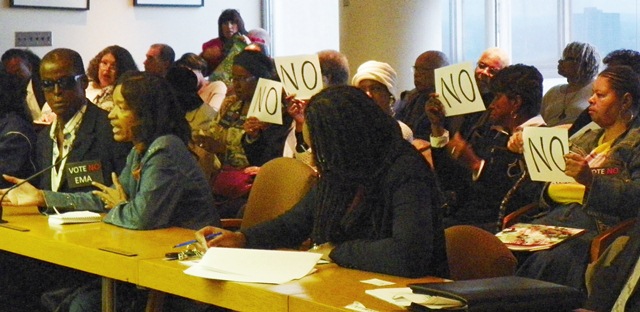
Jackie Taylor (second from left) addresses Council while audience demands a NO vote on EMA, other contracts.
“I am utterly opposed to the Milestone Agreement Mayor Bing signed with the state, without the Council’s approval,” Cecily McClellan of Free Detroit-No Consent said. That agreement, signed Nov. 13, includes the Miller-Canfield contract as a requirement for Detroit to obtain the remainder of the $137 million it borrowed from the state in April.
“There is no reason this body should even consider a contract that would give away the water department, particularly knowing about campaign finance money water contractors gave to [Council Pres. Pro-Tem] Gary Brown. Brown and Pugh are not working for this city; they’re working with the Board of Water Commissioners and Judge Sean Cox. As far as Miller Canfield, if Bing didn’t think he could resolve this city’s problems without their advice, he shouldn’t have run for office.”
As part of a special “Roots Cause” committee established by right-wing U.S. District Court Judge Sean Cox, Pugh and Brown signed a Nov. 8 recommendation for total separation of DWSD from the city, to allow the implementation of the EMA contract regardless of the Council vote. Cox has not yet ruled on that recommendation.
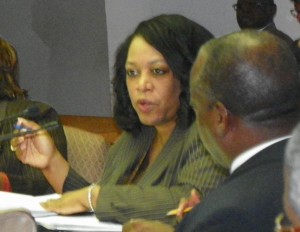
Corporation Counsel Krystal Crittendon tells Council she could NEVER approve Miller Canfield contract under state’s extortionate terms.
They also signed recommendations for partial separation and drastic anti-union measures which were part of Cox’s Nov. 4, 2011 order. That order is awaiting a decision from the Sixth Circuit Court of Appeals on union challenges heard in oral arguments in Cincinnati Oct. 9, 2012.
Testimony by Detroit Corporation Counsel Krystal Crittendon was key to the Miller Canfield vote. Her powers to enforce the city’s Home Rule charter were cemented by Detroiters’ approval of local proposal C Nov. 6.
 “There are a number of conflicts of interest [in the contract] that I cannot ethically advise this body on,” Crittendon said, after audience members applauded her entrance.
“There are a number of conflicts of interest [in the contract] that I cannot ethically advise this body on,” Crittendon said, after audience members applauded her entrance.
“The Charter requires the Corporation Counsel to prepare or approve all contracts with outside legal firms. I did neither.”
Discussion of the contract included revelations that Miller Canfield represented all sides, the city, the state and the Michigan Finance Authority, in preparing Public Act 4, the Fiscal Stability Agreement, and the $137 million bond documents. Deputy Auditor General Mark Lockridge testified that Miller Canfield forced him to sign a non-disclosure agreement before he reviewed their invoices to the city, and that he could not therefore reveal what he found to the Council.
Asked by Councilwoman Brenda Jones if the Council would be violating the Charter if it approved the contract, Crittendon said, “My opinion is that you would be violating the Charter.
Regarding the state’s threat to withhold $30 million in already approved bonds, Crittendon said she could NEVER ethically approve a contract extorted under those circumstances.
Project Manager Walter “Kriss” Andrews, hired under terms of the FSA, said he was among the parties recommending approval of the contract. When the Council voted 8-1 against it (Gary Brown being the lone dissenter), he stormed out of the meeting.
The status of the FSA itself since the repeal of Public Act 4 has been the subject of several closed sessions the Council has held with Crittendon, who may prepare a legal challenge to it. Her previous challenge, based on the state’s outstanding debt to the city of over $300 million, was denied by Ingham County Circuit Court Judge William Collette, who said she did not have standing to sue.
The Council also voted to delay the sale of 1500 parcels of Detroit land to Hantz Farms, two-thirds of it occupied by homeowners and renters, until after a public hearing Dec. 11, and pledged not to approve the Henry Ford Hospital development until a community benefits agreement is in place. But it was clear during the session that the push to approve both as soon as possible is still on.
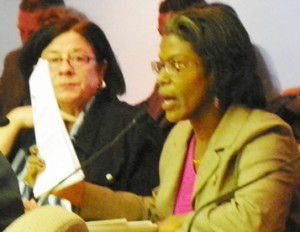
TRU leader Ruth Johnson presents Council with “D” report card on bus service, as Susan Glaser listens.
Council voted against all but one of six D-DOT management contracts worth $58 million, but said they would allow emergency interim contracts until permanent management is found. Ruth Johnson, head of Transportation Riders United, presented the Council with a “D” report card on current transportation service under those managers.
The Council also voted not to approve Bing’s Executive Organization Plan which axes the Detroit Health and Wellness, Human Services, and Workforce Development Departments. It was unclear what impact that would have as the departments have already been substantially shut down and privatized.

Detroit Employment Solutions CEO Pamela Moore, formerly head of the Detroit Workforce Development Department, at Council Nov. 20. 2012.
Wayne County Circuit Court Judge Wendy Baxter recently ordered laid-off DWDD workers back to jobs with the privatized Detroit Employment Solutions, if employees currently there are performing the same work. However, DES CEO (also former DWDD department head) Pamela Moore told the Council they have taken no action to re-hire them yet.
Residents across the city who could not come to Council’s day-time and evening sessions watched on their TV’s and computers.
“They tore the Council a new one,” one Detroiter remarked about the blistering three hours public comment during the day-time session, and more at a Council community meeting held at Mark Twain School that evening.
Pugh, Council President Pro-Tem Gary Brown, and Councilman Kenneth Cockrel, Jr. in particular demonstrated utter contempt for the public in turn.
Pugh refused Councilwoman JoAnn Watson’s adamant demand to hold the session in the auditorium, slammed down his gavel, interrupted speakers every 30 seconds with a notice of their remaining time, and ignored them while focusing on his computer and other matters.
He also confronted former Detroit school board member Marie Thornton when she called out “Where’s the grapes?”
“There will be no grape-throwing and no disrespect of the process,” Pugh responded. How can you refer to one of the most disgraceful incidents in this city’s history, that you were part of?” Pugh told Thornton.
He apparently confused her with Agnes Hitchcock, leader of Call ‘em Out, who threw what became known as “the grapes of wrath” at school board members who voted for the closing of 50 schools in 2004, the first of hundreds which have since devastated Detroit’s public school system.
Brown said large swaths of the city need to be “mothballed,” with regard to the Hantz deal. Cockrel, Jr. called the hundreds who came out to comment “the peanut gallery.”
Ultimately, Detroit police, who had guarded Council doors to keep people out, expelled angry Detroiters including Sandra Hines and Morris Mays as they shouted out their condemnation of the Council members’ abuse, but not before they said what they came to say.
Among many dozens of comments (please excuse name misspellings as it was not always possible to go to the speaker to get the correct spelling due to council security):
Theo Broughton, Hood Research: “DWSD is the biggest asset the city has. This is nothing but vulture capitalism. They make the city borrow money and then suck it dry for its assets through rampant corruption.”
Sandra Hines, Free Detroit-No Consent: “I outright oppose the Memorandum of Understanding [Milestone agreement between Bing and Dillon]. As Councilwoman Watson said, the city’s water is gold. Why would you take away from the people the very things we need to survive as a people? Many of you made backroom and bedroom deals to give our city away.”
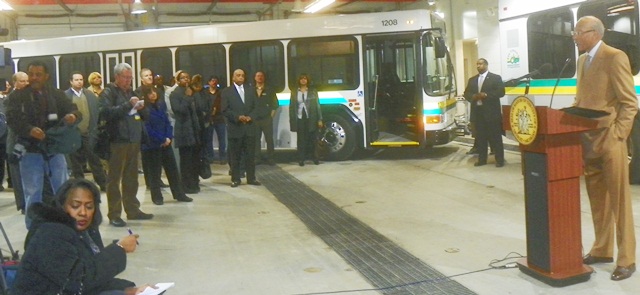
Bing at press conference Feb. 22, 2012 announces hiring of Parsons Brinckerhoff, Envisurage, and Ronald Freeland to manage D-DOT. At far left is Bill Nojay, forced to resign as Freeland’s Deputy Director after a Hatch Act complaint was filed against him for running for public office in New York while overseeing federal funds.
Ruth Johnson, Transportation Riders United: “We just gave D-DOT a grade of D, up from our last report of D-. Buses are now 67 percent instead of 63 percent on time, despite the loss of service, the failure of the 4/15 plan on the major routes. Riders are left hanging on the phone after trying to reach customer service nine times.”
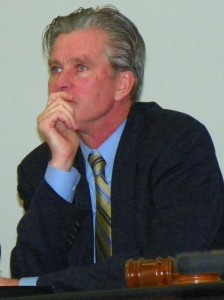
Speaker wanted Treasurer Andy Dillon to come explain himself to Detroit residents; he is shown here being put through the wringer by them at meeting of the Financial Review Team.
Susan Glaser, SAAA, Pension Board, laid off city worker: “The EMA contract is about giving away the rest of the city, even though it has no money problems, before you hit the pension system by July 1. The vultures are swarming, civil service has been dismantled, and I am now laid off with no health benefits after 30 years with the city.”
Richard March (sp?): “It is absolutely despicable to say that we will die as a city unless Miller Canfield, which wrote the consent agreement, is hired again. Have Andy Dillon come to the table and explain why.”
Alice Burke, DWSD retiree: “EMA has not given you everything you need to know, including the cost of replacements and automation. The EPA asked for additional time to look over the contract, but I understand you have decided not to give it to them, so you’ll probably continue hearing from them about violations for the next 30 years if you approve this contract.”
(Name?): “Where I live, people who have been in their homes for generations are getting new homes on the streets. You won’t pay attention to what the citizens are saying. We put you where you are, but you are putting us in the street with no benefits.”
Phil Jones, chair of the Detroit Food Policy Council, on Hantz: “We are not about stopping development, but there is a need for proper process. Selling the land like this sets a precedent going forward. Any vote on this needs to be delayed at least a couple of months.”
Mildred Robbins of the West Grand Boulevard Collaborative and Community Coalition: “There must be transparent negotiations with the developers. They seem to think that because our homes are not grand, this is not necessary. They are receiving tax breaks and money from the federal and local levels. We want jobs and training for our residents and adequate city services. We ask for a no vote on this deal.”
(Councilwoman Watson and residents of southwest Detroit near the Ambassador Bridge, who earlier blockaded the bridge to protest bridge owner Matty Moroun’s devastation of their neighborhood, all advocated Community Benefits Agreements for every land development deal.)
Marie Thornton, former school board member and precinct delegate: “Council members Charles Pugh and Gary Brown no longer represent us, since they signed the Root Cause agreement. You knew this meeting was taking place and you should have set up proper accommodations. You are in violation of the Open Meetings Act.”
(Name?): “Dave Bing sitting at the table advised by McGee of Miller Canfield was a violation of the City Charter, and so is the Milestone Agreement. Outside counsel must be approved by the Corporation Counsel. Attorneys [Richard] Mack and [Herbert] Sanders [representing AFSCME], I hope you are entertaining filing a lawsuit against anyone on this council that votes in favor of this contract.”
Tyrone Travis: “Everyone in the consent agreement including the Project Management Director, the CFO, the Financial Advisory Board and their staffs must be fired immediately. The community better get busy and be organized in 2013.”
Valerie Burris: “A bloodless coup is taking place in Detroit, replacing a Home Rule city with private corporations under the name of ‘reform’ and ‘reconstruction.’ We must meet their violence by any means necessary. Hit the streets! Workers must fight for their jobs, retirees for their pensions, homeowners for their homes and schools. WE are our salvation, not these people in front of us!”
Joseph Rowland, DWSD worker: “Vote NO on all these contracts, especially EMA. In Toronto, they were a disaster. They cut the staff at their pump and substations in half, and the city’s subway stations and homes and neighborhoods were flooded, costing the city $1.2 billion. They have been in Toronto for 16 years, and the same problems are still there. We at the Wastewater Treatment Plant are the real public safety officers of this city. Our work affects 4.3 million people in Michigan. A simple mistake can cause a life-threatening disaster. EMA can’t manage Toronto’s water department, which is half the size of Detroit’s, so how can they manage Detroit’s?”
Ed McNeil, assistant to Al Garrett, President of AFSCME Council 25: “We are requesting criminal and civil investigations of the ethics violations involved in letting millions of dollars of contracts, including Miller Canfield, the primary drafter of Public Act 4, the consent agreement, the bond agreement and the Milestone Agreement, all of which are slanted heavily in favor of the state.”
Marcella Slappey: “You must reconsider saving the Department of Human Services. The contractors are not providing services to the people, no one is monitoring the funds. This is a violation of our civil rights and we are filing lawsuits under Title VI and VII.”
Greg Newsome: “I just recently purchased a home in the Hantz area. I am very concerned about the sale of the land with a lack of community engagement, and a lack of accountability.”
(Name?): “Research needs to be done. The Council is accountable to the people. I am speaking on behalf of those who have had their homes foreclosed while a wealthy person buys up the land. This is not about money, it is about quality of life. Land and water mean wealth and power for the people.”
Susan Ryan, DWSD worker, AFSCME Local 207 officer: “There is no respect for democracy. A federal judge assisted by Charles Pugh and Gary Brown are ordering the future of our water department. If you can’t handle the heat [directed to Pugh and Brown] stay out of the kitchen.”
Cheryl Minnifield, retired DWSD worker: “Before [Dennis] Archer opened the floodgates, knowledgeable employees and managers brought DWSD into compliance with EPA requirements and out of receivership. But now you are constantly taking from operations and maintenance staff to pay the water department’s debt and its contractors. There is no longer any competent management, technicians, chemists and others in place no longer have state licenses.”
Mike Mulholland, DWSD worker, secretary-treasurer AFSCME Local 207: “This process makes a mockery out of democracy, but people who want to take over Detroit want it this way, because no one will vote for what they are doing to our schools and city. I cannot believe any City Council member would sign a document to separate the water department from the city, even agreeing to give it its own Social Security number. There are hundreds in the hallway, wastewater treatment plant workers went on strike, the city is getting ready to blow!”
Tia Lebhertz, Food and Water Watch: “According to research we have done, water rates increase an average of 15 percent a year when water departments are privatized. The understaffing proposed under the EMA contract will affect the quality of our water. Under the Board of Water Commissioners, there is a lack of transparency.”
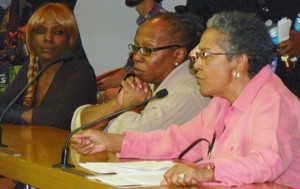
Speakers including Rhonda Anderson (center) and Marian Kramer of the Michigan Welfare Rights Organization.
John Riehl, President AFSCME Local 207: “A recent study by the Detroit Engineering Society showed that DWSD needs more staffing, not less, to stay in compliance with the Clean Water Act. Gary Brown and Charles Pugh have signed off to give the judge more power by separating the water department and putting the EMA contract under the Board of Water Commissioners only. But keep in mind the battle is not over. [VOD: i.e. Cox has not signed off on the Root Cause Committee recommendations, the EPA has not issued its report despite Brown’s claim that DWSD Director Sue McCormick said in a letter that the EPA has OK’d the contract, the Sixth Circuit has not ruled on the unions’ lawsuits against Cox’s orders, and the numbers of people turning out to stop the destruction of Detroit are growing.]

Councilman Kwame Kenyatta supported Corporation Counsel Krystal Crittendon and blasted Miller Canfield. He first exposed their role in authoring Public Act 4.
Valerie Glenn, Free Detroit-No Consent: “The Council cannot alter or infringe on the rights of our citizens, even if it and the Mayor have been bought. The entire Milestone Agreement is unconstitutional. The Council must not go forward with the Ernst & Young, Miller Canfield, and Milliman. Charles Pugh and Gary Brown, you committed TREASON when you signed the Root Cause letter.”
Bill McMasters, Michigan Taxpayers United: “I represent 300 Detroit residents. The Public Health and Safety Committee (chaired by Brown) only yesterday voted out $58 million in D-DOT contracts with private firms, but you are allowing the public only one and a half minutes of comment.”
Dozens of other citizens presented comments in similar vein on the various issues, but space is limited here. One said, “I’ll bet the CEO of Hantz Farms got more time than one and a half minutes when he discussed the largest land sale in the city’s history with you.”



